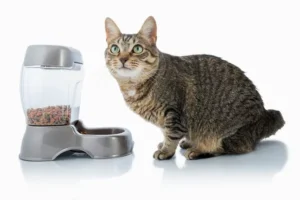Keeping our cats healthy and safe is always our top priority. Unfortunately, cats, like humans, can contract serious diseases. One of the most dangerous is feline leukemia, which behaves differently from the leukemia seen in humans.
Read on to learn more about feline leukemia in cats, including symptoms, transmission, diagnosis, and prevention, from our Moline, IL veterinary team.
What Is Feline Leukemia (FeLV)?
Feline leukemia virus (FeLV) is a contagious virus that affects only cats. It weakens the immune system by invading healthy cells, which then either die or mutate. In some cases, this mutation can lead to cancer, but not always.
FeLV spreads easily and can be difficult to detect, especially in the early stages.
What Happens When a Cat Contracts FeLV?
This virus is unique and hard to find because of how easily it hides. Every cat is different. It is important to note that not all cats react the same way once they get the virus. Some cats may begin showing symptoms nearly immediately after being exposed to the virus. At the same time, other cats exposed to the Feline Leukemia Virus can go months or years without experiencing any symptoms.
Interestingly, some cats are able to defeat the virus without any medical attention. The cat’s immune system is strong enough to fight it off on its own. This is also why it is more likely for older cats that have pre-existing conditions to get serious effects from FeLV. Pet owners can prevent the Feline Leukemia Virus, but not before knowing the causes and symptoms.
How Is Feline Leukemia Transmitted?
FeLV spreads through close contact with an infected cat. Bodily fluids like saliva, blood, urine, and feces can transmit the virus. Common transmission methods include:
- Grooming
- Sharing food or water bowls
- Play fighting or real fighting
- Using the same litter box
Outdoor cats or cats living in multi-cat households are at higher risk. Indoor-only cats with no exposure to other felines have a lower risk.

Signs & Symptoms of Feline Leukemia
Since this virus is unique, every cat shows symptoms differently. When exposed and infected with the virus, some cats will have no symptoms and can fight the virus through their strong immune system. This, of course, is not the case for all cats.
Young kittens and cats between the ages of 1-2 years old are likely to become infected with feline leukemia and display outward symptoms. The symptoms can be any of the following:
- Loss of appetite
- Weight Loss
- Pale Yellow Gums
- Bladder infection
- Upper respiratory infection
- Lack of energy/lethargy
- Fever or general malaise
If any of these symptoms show in your cat, it is time to bring them to our Moline, IL animal hospital for additional testing. There is no way to know what is causing the signs or symptoms without additional help, as many of these symptoms can be found in other conditions as well.
Diagnosing Feline Leukemia
To confirm FeLV, your veterinarian will begin with a physical exam and medical history. If FeLV is suspected, a rapid blood test is performed. This test is quick and minimally invasive.
A follow-up test 8–12 weeks later may be needed to confirm if the virus remains in the bloodstream.
Treatment Options for Feline Leukemia
Unfortunately, there is no cure for feline leukemia in cats. Most cats diagnosed with FeLV live up to three years post-diagnosis. However, early detection and supportive care can improve your cat’s comfort and quality of life.
Supportive care may include:
- Regular checkups and wellness exams
- Preventative treatment for secondary infections
- Nutritional support and immune-boosting supplements
- Limited use of chemotherapy in cancer cases, but no definitive results have been seen
How to Prevent Feline Leukemia
The best thing to do with feline leukemia is to protect your cat and prevent them from acquiring it. There are current vaccines for cats that help build their immunity to the Feline Leukemia Virus.
However, pet owners should still keep cats away from other cats. If you have a house cat that has never been exposed to another animal, it is not recommended to begin as an adult. Any carrier of feline leukemia can spread it to your fur baby.
Concerned About Feline Leukemia? Call Our Moline, IL, Animal Hospital
Feline leukemia is a serious, often fatal virus—but with early detection and preventative care, you can help protect your pet.
The cause of this virus is through the transmission of fluid like blood, urine, saliva, and feces. The way to prevent your cat from acquiring this disease is by limiting their time with other cats, as carriers don’t always show symptoms.
If you are concerned your feline may have feline leukemia, or if it is time for your cat’s regular exam, our animal hospital is here to care for cats in Moline, Milan, Rock Island, & the rest of the Quad Cities.




